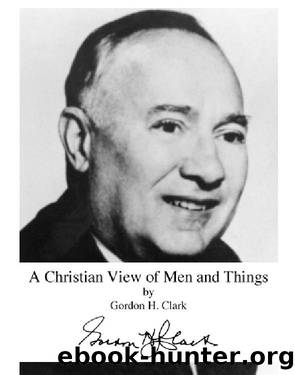2020-09-14 11:11:41.865707 by Unknown

Author:Unknown
Format: epub
Published: 2014-06-04T16:00:00+00:00
In this quotation from Henry More it is to be noted that he takes his principles to be immediately and irresistibly true without need of proof, deduction, or argument. Now, to be sure, just before the end of this quotation, More uses the word “consequences.” But the consequences he has in mind are the logical consequences or implications of the principles. Through the rest of his book he attempts to show how the virtues of prudence, justice, piety, probity, temperance, and so on, are consequences of the noemata. He is therefore not concerned with the amounts of pleasure and pain that an act may produce, but with the logical analysis of immediately perceived truths. For the present purpose it is not necessary to decide whether More’s analysis is correct or not. The logic by which he passed from his axioms to his theorems need not be examined. Nor need we consider as an objection to More the theory that denies the very possibility of immediate truths. There are some philosophers who reject any view depending on innate ideas or intellectual intuitions. This epistemological problem would lead too far afield at the moment. Let it be granted that a system may have, if not immediate first truths, at least presuppositions, postulates, assumptions, or axioms. However, these must not be multiplied with abandon. Such primary principles must be restricted to a small number. The ideal in logical systems is to make as few assumptions as possible and to deduce as many theorems as possible. The British Intuitionists, unfortunately, were too liberal with their first principles. If this type of theory is to meet with general approval, it must be worked out on the basis of a single principle, or at most two or three, but certainly not two or three dozen. Immanuel Kant, in his theory of the categorical imperative, closely approximates this ideal.
Download
This site does not store any files on its server. We only index and link to content provided by other sites. Please contact the content providers to delete copyright contents if any and email us, we'll remove relevant links or contents immediately.
The Fine Print (Dreamland Billionaires Book 1) by Lauren Asher(2548)
Fury of Magnus by Graham McNeill(2437)
The Last House on Needless Street by Catriona Ward(2380)
The Rose Code by Kate Quinn(2189)
A Little Life: A Novel by Hanya Yanagihara(2096)
Malibu Rising by Taylor Jenkins Reid(1902)
The God of the Woods by Liz Moore(1895)
Luster by Raven Leilani(1894)
Transcendent Kingdom by Yaa Gyasi(1846)
Moonflower Murders by Anthony Horowitz(1840)
The Lost Book of the White (The Eldest Curses) by Cassandra Clare & Wesley Chu(1681)
This Changes Everything by Unknown(1499)
The Midwife Murders by James Patterson & Richard Dilallo(1476)
The New Wilderness by Diane Cook(1435)
The Lying Life of Adults by Elena Ferrante(1425)
Wandering in Strange Lands by Morgan Jerkins(1406)
Written in the Stars by Alexandria Bellefleur(1391)
Ambition and Desire: The Dangerous Life of Josephine Bonaparte by Kate Williams(1380)
The Lying Life of Adults by Elena Ferrante;(1302)
